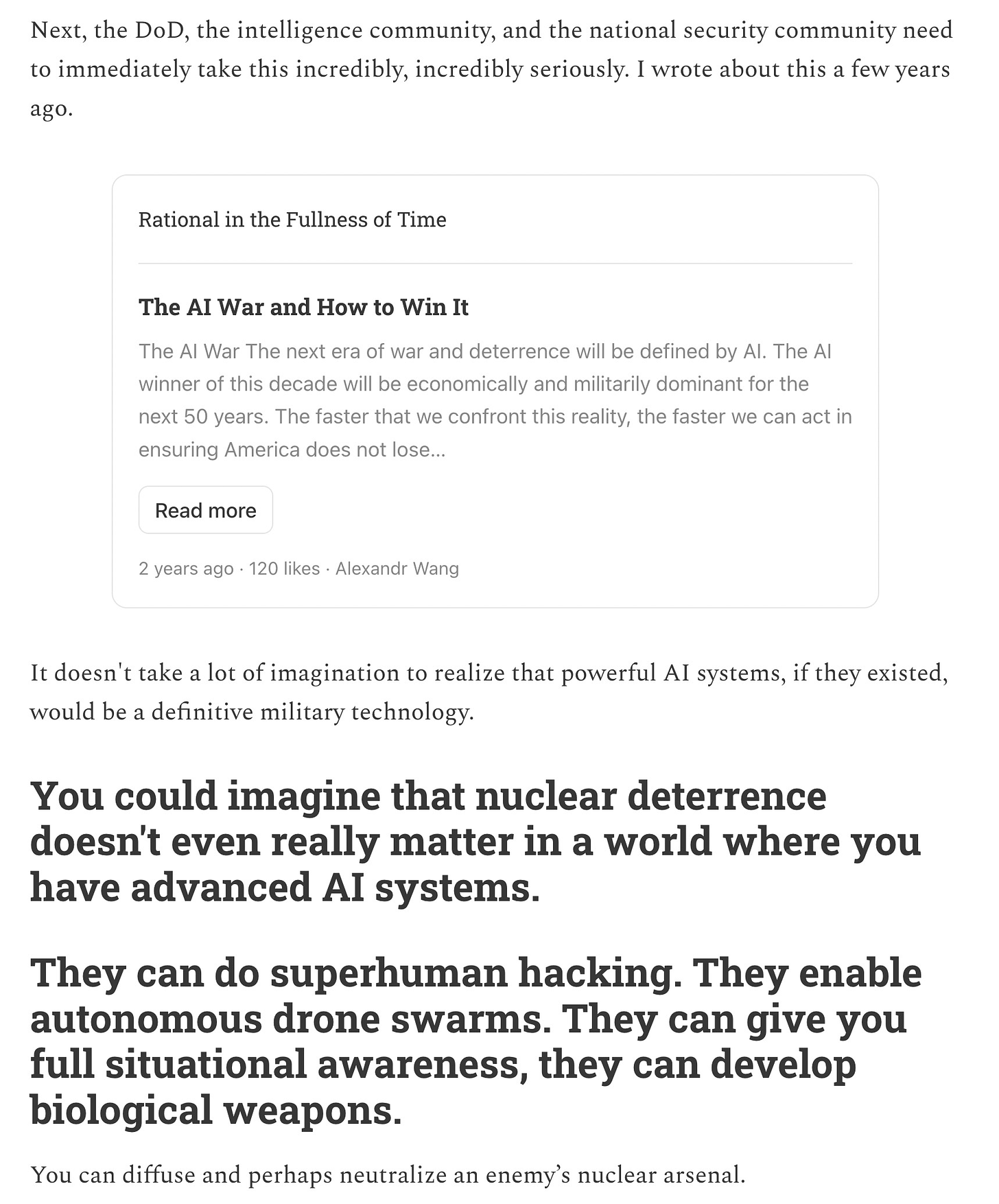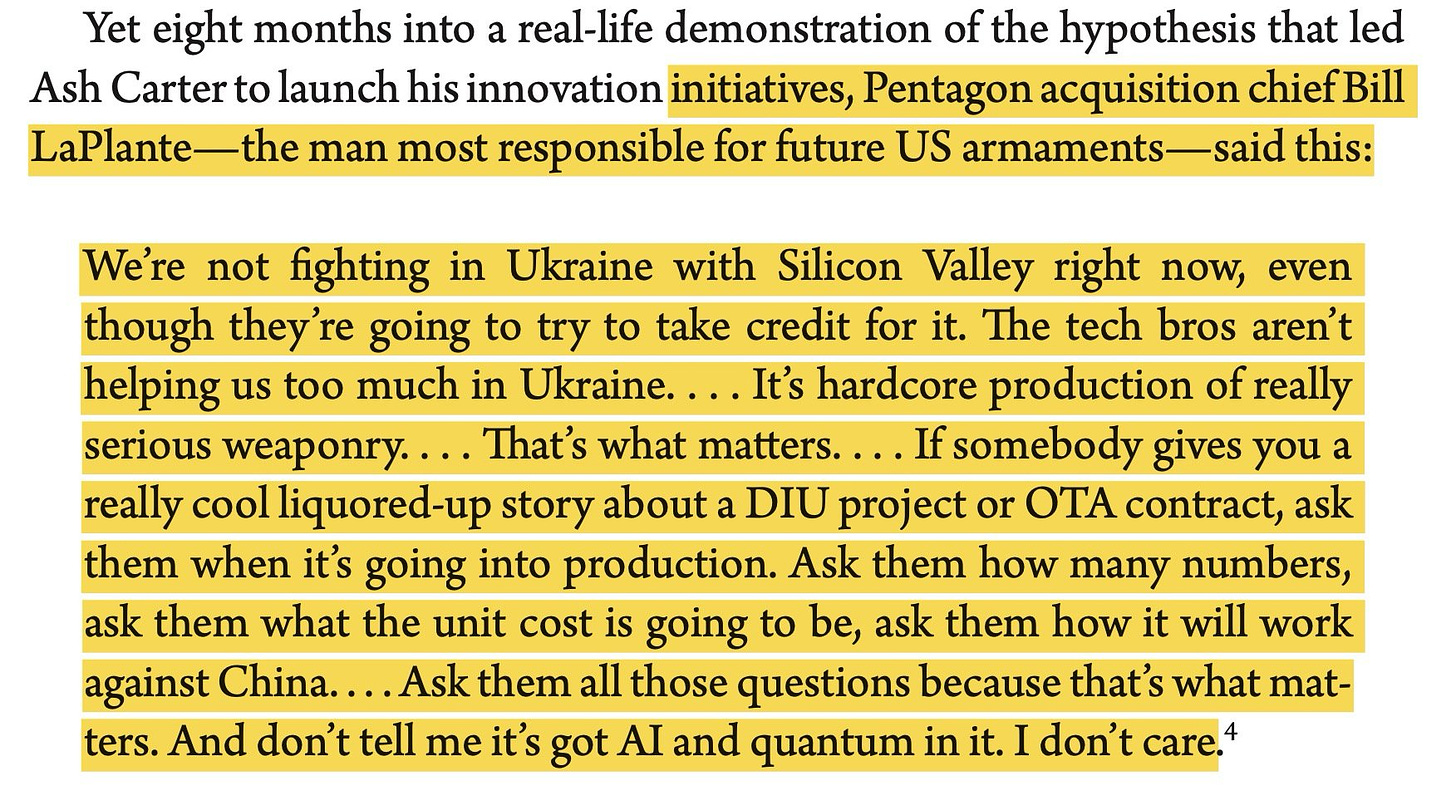The Most Essential Battle of the Russo-Ukrainian War
will be the one over the Lessons Learned
Technological advancement, tactical innovation, and the new capabilities physics and engineering bring to the profession of arms have always been a decisive edge in any war. The problem is, in too long a time in peace, it can be hard for a military to get a clear view of what will be needed in the next war.
As we’ve often discussed here, that is why you have to look closely at small and especially medium-sized wars, as these will give you indications and warnings of what new technologies, ideas, and concepts actually survive, and perhaps prosper, in first contact with the enemy.
Likewise, comfortable and sexy ideas that at peace briefed so well, are quickly measured and found wanting.
The above is no great insight, it has been a known truth from the dawn of time - but because it is known, every new war begets a cloud of camp-followers who are little more than salesmen trying to tell you - and sell you - that they have the key insight, the new “transformational” understanding of what you need to focus your mind, and more importantly, your budgets on.
Some of these are well-meaning people of two breeds; 1) smart, but wrong; 2) overly-excitable people with too many energy drinks feeding a life shaped by science and military fiction.
There are also opportunists. I wouldn’t quite call them bad-faith actors - though some are there - but they are simply people who see a need and are trying to get paid to fill a need.
What need is that? A simply play for those Maslowian brain-stem requirement of safety and comfort.
War is scary, hard, and expensive. The dreadful history of war is one of seas of blood, mountains of debt, and a miasma of pain, sorrow and misery. Surely there has to be a better answer than the long, hard, slog that history shows us.
How about a 72-hour war? A three-week war? Isn’t there a “war winning” technology that gives us that insurmountable edge over our opponents that short-circuits the requirements for large, expensive, and economically burdensome industrial all-of-society wars?
A large portion of the people hunger for that workaround, and there are people ready to feed it to them. These salesmen aren’t just in it for ust the reasons above, but also for very personal reasons.
While this may border on bad-faith, it isn’t. It is just ambitious narcissism.
Some very ambitious people want, in some small way, immortality. They want their name attached to some pivotal historical idea or even. They want to be the Marshall in the Marshall Plan. They want to be the Kennan of "Long Telegram" fame. Maybe a LeMay, a Rickover, or for some an Oppenheimer? A Clausewitz? Better yet, a Dr. Zefram Cochrane?
These are the people we should all be on the lookout for.
Jordan Schneider over on X pointed out a prime example for us last week of this at work, for years now, on what we should take away from the largest land war in Europe since WWII. To keep this short, I’ll stop at this contrasting example.
There are two schools.
As mentioned above, this battle is already over two years old. Both these quotes are from 2022 where you could already see these two schools setting up shop.
School (1) Alex Wang:
School (2) Bill LaPlante:
Here we are in the summer of 2024, and both arguments are still in battle. This is good, as the correct answer is both, but … the existential problem with Ukraine right now is clearly School (2), and that is also where, as we look west across the International Date Line, we see the greatest shortfall.
Don’t get me wrong, we need all the intellectual heft and ideas in School (1) we can get, but should we find ourselves … no … belay my last … when we find ourselves embroiled in another major conflict, it is School (2)’s concern that will buy us the time to see if School (1) can play.
Too many people thing they have a “war winning” technology or CONOPS that is the warfighting “Easy Button.”
There is no thing. There are no magic beans, no matter how much you wish them to be. School (1) will always be Supporting effort; School (2) must be the Supported effort.
Tech bros won't save us. If that is where you are placing most of your chips, you are setting yourself up for losing another war - this time a much larger and consequential one.






Military power is the first derivative of a nation’s energy and industrial power.
In the US, for example, Alfred Mahan didn’t just advocate for a new kind of Navy. He advocated for an American industrial base that could build that Navy. Decades later, Hyman Rickover spent much of his time promoting a national education system that could support an industrial system that could support the Navy.
I have always been a disciple of “ToT”, Tactics over Technology. Innovation wins wars. Ie. LCDR Jimmy Thatch and the reorder of the composition of naval air formations, and of course the weave. One of ToT lesson for the Ukraine war / Houthi needs to be a discussion of FPV and offensive / defensive tactics to include economy of scales when defeating them. Passive and active defensive measure lessons must be learned and offensive countermeasure lessons must be learned. The FPV as an up close and personal killing weapon is a refinement of the reaper and shadows of the last 20-30 years. Cheaper and deadlier.
Regarding the Houthis, hypersonic missiles being used to attack maritime targets is also a lesson we need to learn and quickly.
Both threats apply to our coming war with China. We better be prepared. Regarding AI, I haven’t seen the continuity in relations of AI and ROE. That has to be worked out for all sides. Discerning friend from foe with an AI director should scare the shit out of all of us.